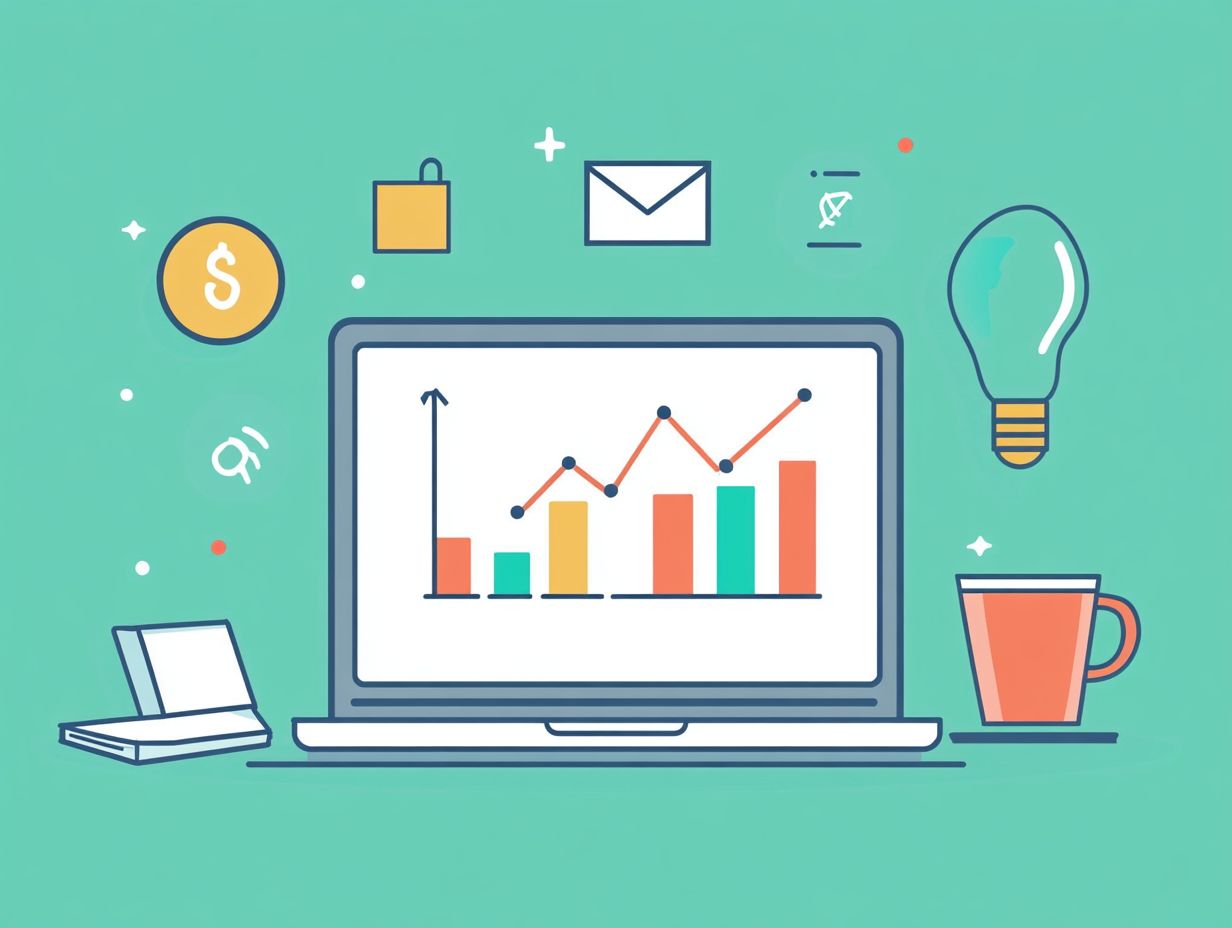What Tools Can Automate Lead Generation?
Let's Set Up Your Lead Generation Strategy
Fill out the form below, and our team will get in touch with you to create a tailored solution for your business.
Lead generation is a key part of any effective marketing strategy, serving as the vital link between potential customers and your offerings.
This article looks at the basics of lead generation, examining both traditional approaches and the transformative potential of automation.
You’ll gain insights into essential tools and learn how to select the right features to navigate the lead generation landscape.
Discover how to implement email marketing automation with finesse and measure your success using key metrics that guarantee your efforts yield significant results.
Contents
- Key Takeaways:
- Understanding Lead Generation
- Manual Lead Generation Techniques
- Let's Set Up Your Lead Generation Strategy
- The Role of Automation in Lead Generation
- Types of Lead Generation Tools
- Let's Set Up Your Lead Generation Strategy
- Features to Look for in Lead Generation Tools
- Important Considerations for Choosing a Tool
- How to Implement Lead Generation Automation
- Measuring Success with Automated Lead Generation
- Let's Set Up Your Lead Generation Strategy
- Frequently Asked Questions
- What Tools Can Automate Lead Generation?
- How Can CRM Tools Help Automate Lead Generation?
- What Does Marketing Automation Software Do for Lead Generation?
- What Role Do Lead Capture Forms Play in Automating Lead Generation?
- Can Chatbots Be Used to Automate Lead Generation?
- How Can Social Media Management Tools Help Automate Lead Generation?
- What Role Does Email Marketing Software Play in Automating Lead Generation?
- Let's Set Up Your Lead Generation Strategy
Key Takeaways:

- Use automated tools to save time and money.
- Choose tools with features that really work, like email automation or CRM integration.
- Effective implementation and tracking of lead generation automation can significantly increase conversion rates and overall success.
Understanding Lead Generation
Lead generation stands as a pivotal element of any thriving online business strategy, centered on attracting and converting potential customers into qualified leads.
To grasp the essence of lead generation, you must acknowledge its vital role in boosting conversion rates and enhancing customer interactions. There are diverse marketing strategies at your disposal to refine this process.
With technological advancements paving the way, automated lead generation has surfaced as an exceptionally effective method, bolstered by cutting-edge lead generation software and customer relationship management (CRM) tools, which help manage customer interactions.
These innovations not only streamline the lead capture process but also elevate overall efficiency, setting you on the path to success.
Definition and Importance
Lead generation is the art of identifying and attracting potential customers, guiding them toward becoming qualified leads for your sales and marketing endeavors.
This vital stage in your sales funnel lays the groundwork for cultivating a strong customer base. By collecting relevant data, you can effectively hone in on your target audience.
Understanding who shows interest in your products or services offers invaluable insights, simplifying the process of tailoring your marketing strategies.
Utilizing CRM tools to nurture leads allows you to provide personalized engagement, cultivating their interest and trust in the process.
This nurturing phase not only boosts your conversion rates but also fosters long-term relationships, transforming prospects into qualified leads and loyal advocates for your brand.
Manual Lead Generation Techniques
Manual lead generation techniques have long served as the backbone of countless businesses, employing traditional methods like networking, cold calling, and direct mail to draw in potential customers.
Let's Set Up Your Lead Generation Strategy
Fill out the form below, and our team will get in touch with you to create a tailored solution for your business.
However, these approaches often come with limitations that can stifle growth. Typically, they involve using lead capture forms to collect visitor information and executing targeted campaigns aimed at specific demographics or interests.
Yet, the dependence on manual processes can result in inefficiencies and missed opportunities, especially in the rapid-paced realm of online business.
Traditional Methods and Limitations
Traditional methods of lead generation, such as networking and cold calling, may seem familiar, but they often come with significant limitations when it comes to efficiency and scalability.
You might find that these approaches lead to time-consuming processes that yield minimal results. For instance, networking events can consume hours of your time without guaranteeing valuable connections or qualified leads.
Cold calling, while a staple in the industry, often faces resistance that can leave you feeling frustrated and drained. The repetitive nature of these tasks can stifle your company’s growth, as the energy expended doesn’t always translate into actionable outcomes.
Embracing more innovative and data-driven methods, such as A/B testing, can help you overcome these challenges, driving more targeted and effective results.
The Role of Automation in Lead Generation

Automation has transformed the lead generation landscape. It enables you to streamline processes and enhance conversion rates with cutting-edge marketing automation tools.
By integrating automated lead generation systems, you can capture leads and deliver personalized experiences. This approach boosts your efficiency and increases the likelihood of turning prospects into loyal customers.
Benefits and Advantages
Incorporating automation into your lead generation strategy provides numerous benefits, such as increased efficiency and improved conversion rates.
By simplifying repetitive tasks, you can save invaluable time, allowing your team to focus on strategic initiatives. Automation tools help you target your campaigns precisely, ensuring your messaging reaches the right audience at just the right moment, which significantly boosts engagement rates.
This level of precision is further enhanced by your ability to analyze complex customer data, offering actionable insights that support smarter decision-making. Such data-driven approaches let you continuously refine your strategies, ultimately nurturing leads into loyal customers.
Types of Lead Generation Tools
You have access to an impressive array of lead generation tools designed to enhance various aspects of the lead generation process. From sophisticated lead generation tools and email marketing automation systems to dynamic social media automation platforms, these resources enable you to capture invaluable data from website visitors.
With these tools, you can effortlessly segment your audience and create targeted campaigns that resonate with potential customers. This smart approach boosts engagement and drives up conversion rates, attracting more qualified leads.
Overview of Different Tools Available
You have a variety of lead generation tools at your fingertips, including well-known platforms like HubSpot, Mailchimp, and ActiveCampaign, each offering unique features tailored to different business needs.
Let's Set Up Your Lead Generation Strategy
Fill out the form below, and our team will get in touch with you to create a tailored solution for your business.
HubSpot stands out with its robust Customer Relationship Management capabilities, allowing you to track interactions and manage leads throughout the sales funnel. Mailchimp is renowned for its email marketing expertise; it integrates seamlessly with e-commerce platforms, enabling you to create targeted campaigns based on customer behavior. Meanwhile, ActiveCampaign excels in automation, providing sophisticated workflows that trigger personalized follow-ups, ensuring that no potential lead slips through the cracks.
These tools supercharge your lead management and work harmoniously with other marketing automation tools like Salesforce, adding layers of efficiency and insight to your marketing strategies.
Features to Look for in Lead Generation Tools
When selecting lead generation tools, it’s essential to consider various features that can elevate user experience, refine lead scoring, and enhance customer analytics, ultimately optimizing your lead generation efforts.
A comprehensive lead generation tool should provide capabilities for automated lead nurturing, in-depth reporting, and seamless integration with your existing marketing systems. This ensures you can manage customer interactions effectively and boost your conversion rates with confidence.
Ready to elevate your lead generation strategy? Explore automation tools today and watch your leads transform into loyal customers!
Important Considerations for Choosing a Tool

When selecting a lead generation tool, consider factors such as integration capabilities, essential features, and pricing. These elements should align with your B2B companies and business goals.
It’s crucial to evaluate the scalability of the tool. Ensure it can adapt as your organization grows and evolves.
User-friendliness should be at the forefront of your decision-making. If a tool is complicated to navigate, it can stifle productivity and hinder user adoption.
Customization options also play a vital role, enabling you to tailor the tool to fit your specific workflows and target audience. Focus on these key factors to select a lead generation tool. This ensures it meets your needs today and supports future growth.
How to Implement Lead Generation Automation
Implementing lead generation automation demands a strategic approach. Follow a step-by-step guide that highlights the key actions necessary for seamlessly integrating automated lead generation techniques into your marketing strategies.
By clearly defining your objectives, selecting the right tools, and carefully planning your steps, you can significantly enhance your lead capture efforts.
Step-by-Step Guide
A step-by-step guide for you to implement lead generation automation includes identifying your goals, selecting the right tools, and designing workflows that elevate customer interactions.
- Start by defining specific objectives that align with your overall marketing strategy, such as boosting conversion rates or enhancing customer engagement.
- Once you have your goals in place, evaluate various automation platforms tailored for lead generation. Ensure they have features like linking with customer relationship management tools and comprehensive analytics to track your performance with precision.
- After choosing the right tools, craft workflows that promote seamless communication with prospects. Use personalized messaging and timely follow-ups to nurture those leads effectively.
Keep an eye on your strategies’ success and be ready to adjust as needed.
Measuring Success with Automated Lead Generation
Measuring success with automated lead generation is key! It helps you understand what works and what needs improvement. Focus on key metrics, such as conversion rates and lead quality, to gain a clear picture.
Let's Set Up Your Lead Generation Strategy
Fill out the form below, and our team will get in touch with you to create a tailored solution for your business.
By diligently tracking progress through comprehensive reporting and analytics, you can uncover valuable insights. This allows you to refine your marketing strategies and elevate your results to new heights.
Key Metrics and Tracking Progress
Key metrics for tracking your progress in automated lead generation encompass conversion rates, lead scoring, and customer analytics. These are vital for evaluating the effectiveness of your campaigns.
These metrics indicate your strategy’s overall success. For instance, by monitoring conversion rates, you can pinpoint which channels deliver the highest returns. Meanwhile, lead scoring helps you prioritize your efforts on high-potential leads. Customer analytics offer deeper insights into buyer behavior and preferences.
To track these metrics effectively, invest in robust CRM tools and analytics platforms that systematically collect and analyze your data.
By leveraging insights gained from these evaluations, you can tailor your campaigns with precision, streamline your resources, and enhance lead quality, creating a more effective sales pipeline.
Frequently Asked Questions

What Tools Can Automate Lead Generation?
There are several tools that can automate lead generation, including:
- Customer Relationship Management (CRM) tools. These are programs that help businesses manage customer interactions.
- Marketing automation tools simplify your marketing tasks.
- Lead capture forms collect information from potential customers, like email addresses.
- Chatbots engage visitors on your site and provide them with offers.
- Social media management tools let you automate and schedule your posts.
- Email marketing software sends personalized messages to potential customers.
How Can CRM Tools Help Automate Lead Generation?
CRM tools help you connect with your audience better. They organize all your customer interactions in one place!
What Does Marketing Automation Software Do for Lead Generation?
Marketing automation tools simplify your marketing tasks. They help you save time on repetitive activities like email campaigns!
What Role Do Lead Capture Forms Play in Automating Lead Generation?
Lead capture forms gather essential info from potential customers. They can easily integrate with your CRM tools to streamline data collection.
Can Chatbots Be Used to Automate Lead Generation?
Absolutely! Chatbots can revolutionize how you engage with website visitors. They can collect valuable lead data while providing relevant information and offers.
How Can Social Media Management Tools Help Automate Lead Generation?
Social media tools let you automate and schedule your posts. This way, you can reach more people and generate leads with targeted content!
What Role Does Email Marketing Software Play in Automating Lead Generation?
Email marketing tools send personalized messages to potential customers. Use them to connect with your audience based on collected data!
Let's Set Up Your Lead Generation Strategy
Fill out the form below, and our team will get in touch with you to create a tailored solution for your business.






